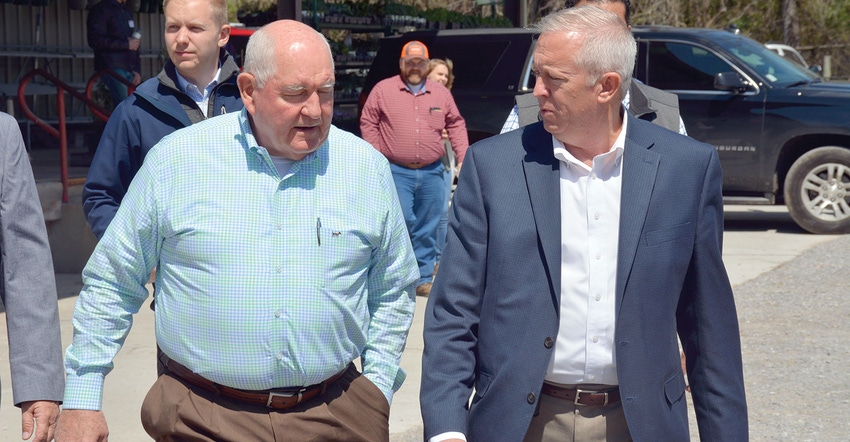
Secretary of Agriculture Sonny Perdue Tuesday reassured farmers that President Trump will not leave them to take the brunt of any retaliatory tariffs China might impose in response to the administration’s efforts to pressure the Chinese into a fair trade policy.
“The president will not let you be the only soldiers in the battle,” Perdue told a standing room crowd at the Tennessee Farmers Cooperative in Knoxville. “Farmers don’t like cheaters and stealers and those who don’t play by the rules,” he added. “The president wants China to play by the rules. I think he has got China’s attention. We want China as a customer; we want fair trading partners across the globe. China has to play fair.”
Perdue touched on two Tennessee commodities, milk and tobacco, that are struggling with lost markets. “We have an oversupply of milk and we have to figure that out. We have no magic bullet in Washington,” he said, but added that USDA will work to find markets.
Perdue said a push to get 2 percent flavored milk into schools may be one option, and noted that USDA was successful in getting 1 percent flavored milk into schools last year.
Working on solutions
Perdue said USDA and the administration are “working on solutions” to market issues. “We may not have it done by the end of May.”
He acknowledged that some dairies are likely to go out of business, and, as a former dairyman, added that “exiting a dairy business is a complex undertaking. Animals have to be fed and milked.” He mentioned that the impact on beef markets when herds are liquidated affects all livestock producers.
He added that tobacco consumption has declined, but did not rule out the possibility that China action could be hurting the tobacco market. “We don’t have as many choices with tobacco. We will do what we can.”
He didn’t focus solely on China but noted that Canada also employs unfair trading practices, limiting import of several commodities. “We want fair trade with Canada, too,” he said. “We do want NAFTA.”
Perdue said a much-needed infrastructure package “is coming along. We have locks and dams that could fail at any time.” In addition to locks and dam, he said the program would target bridges, highways and improvements to broadband availability to rural areas.
Broadening exemption for farm trucking is also on a list of issues to address, he says, noting that small operators are at a disadvantage with electronic log requirements. He said that is part of a largescale process of “unwinding regulations that are layered on so much that they hamper productivity. We are looking at USDA regulations that impede productivity, and unwinding those so you can get back to what you do best — produce.”
He said farmers get more productive every year as they streamline to produce more food. “Precision agriculture is a factor,” he added.
See, Secretary Perdue addresses Tennessee ag interests Photo Gallery, https://bit.ly/2qIFSGS.
Deregulation
Perdue said April 17 is tax day, the deadline to file 2017 income taxes, and offers an opportunity to talk about a big deregulation. “A tax is a regulation,” he said, and the recently enacted tax law, “offers benefits to agriculture,” including cash accounting and 20 percent pass through, among other advantages.
“It also increased the child deduction,” he said. “Agriculture will benefit from growth in the general economy.”
In response to a question from the audience on immigration reform, Perdue acknowledged that labor is one of three issues that farmers across the country always bring up. Trade and regulation are the other two. “Legal farm workers are important,” he said. “We continue to work with Homeland Security and other agencies, and we recognize that the people working on farms are not the people who cause trouble. We need a simpler, friendlier and faster H2A program,” he added. He noted that several bills are being considered in Congress. “We want a simple program so farmers can depend on a labor supply.”
He fielded several questions regarding the farm bill, but noted that the text of the House bill has not been released and the Senate has not completed its version. “We just don’t have the numbers yet,” he said. He did acknowledge that the budget will be a sticking point across the board and that USDA “is willing to do our part.”
To one questioner who asked about programs for beginning farmers and for rural entrepreneurs who want to take advantage of “added value” programs available in current farm policy, he said all those programs will be evaluated as the bills make their way out of committees and debate begins.
Farm bill
He said he hopes to see a farm bill passed by both houses in 2018, but acknowledged that the House version has a bone of contention with the provision in the nutrition title that would require at least 20 hours of work to qualify for food stamps.
Perdue said farmers want a reliable safety net, a program that will step in when production or markets fall to the point that makes continuing to farm unfeasible. He said farmers are not looking for handouts. “I’ve never met a good farmer who did not want to make a crop and get a good price,” he said.
He said his role as secretary of agriculture is to take the concerns of agriculture back to the president and to communicate the president’s ideas back to the agriculture industry.
Blount County, Tenn., farmer Susan Keller, who farms with her husband John and son Sam, said farmers need for Washington to understand. “When they slap on something, it goes far along the food chain, not just to a commodity. At times, it seems like Washington looks at us like we’re a bunch of hicks.”
About the Author(s)
You May Also Like






